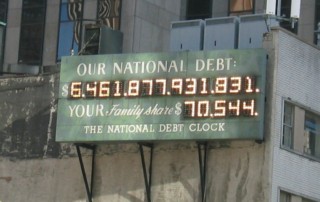Let’s not hide $1.4 trillion of IOU’s
Yesterday on his blog the President’s Budget Director, Peter Orszag, asks himself and then answers the question, “How much does the federal government owe?”
This sounds like a technical question of concern only to “those of us wearing the green eyeshades,” but the Director’s suggested answer has dangerous ramifications, and could mislead, or at least confuse taxpayers and financial market participants.
The Director’s answer makes the federal debt appear $1.4 trillion smaller than the way it is traditionally measured. He argues that we should, in effect, ignore 1.4 million million dollars borrowed by the federal government. That is breathtaking.
Let’s look at the Director’s argument and why I think it’s dangerous.
Most budget experts focus on debt held by the public, which Director Orszag accurately describes as “the amount that the federal government owes to others.” I will expand on that a bit with some concrete numbers:
- Take the total amount the Federal government will spend this year. Specifically, we’re looking at cash”paid” by the U.S. government to someone outside the government in 2009. A budget wonk would call these outlays. I’ll use the nonpartisan Congressional Budget Office’s numbers for current law, so I get $3.85 trillion of outlays for 2009. That is way (way) above historic norms, in part due to the financial stabilization efforts, and in part due to the new “stimulus” law.
- Now take the amount the Federal government will collect in revenues this year. This is cash coming into the U.S. government from someone outside it. Almost all of this is taxes. CBO says this is $2.186 trillion of revenues for 2009.
- If the U.S. government is paying out $3.85 trillion in cash (outlays) this year, but collecting “only” <sigh> $2.186 trillion in cash, then we need to come up with the difference somewhere. That difference is $1.667 trillion for 2009. This is what CBO says is the federal budget deficit for 2009.
- The U.S. government gets this cash by issuing IOUs to people outside the government, aka Treasury bonds. The government gets cash from anyone who buys Treasury bonds – individuals, firms, and foreign governments.
- The debt held by the public is simply the accumulation of these IOUs. It is the sum of money owed by the U.S. government to others. (Update: See the caveat at the bottom.)
Nothing I have said […]
